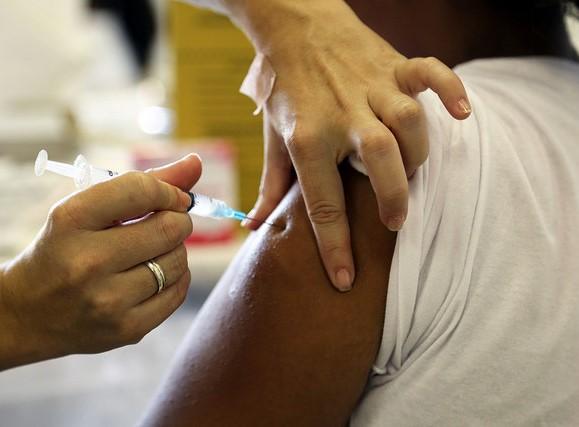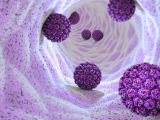A study published yesterday in The Lancet Child & Adolescent Health shows that administering three catch-up doses of the human papillomavirus (HPV) quadrivalent vaccine before a woman turns 21 protects against developing cervical precancers.
In the United States, girls and boys ages 11 and 12 are encouraged to get the vaccine, which has been widely proved to be safe and efficacious at preventing both cervical cancer and genital warts. But three catch-up doses after age 12 are recommended for those who miss the earlier doses.
This nested case-control study included girls and women enrolled in Kaiser Permanente Northern California (KPNC) and compared 4,357 patients up to age 26 with CIN2+ or CIN3+ (cervical intraepithelial neoplasia, abnormal cells that could lead to cervical cancer) with five age-matched controls (21,773) who did not have any abnormal cell growths.
The study found a decreased risk for CIN3+ in girls who received their first HPV vaccine dose at 14 to 17 years (adjusted rate ratio [RR], 0.44; 95% confidence interval [CI], 0.26-0.74). There was no statistically significant protection against CIN3+ in any group who had fewer than three doses of the vaccine, but there was a decreased risk in girls aged 14 to 17 years (RR, 0.27; 95% CI, 0.13-0.56) and a decreased risk in women aged 18 to 20 years (RR, 0.59; 95% CI, 0.36-0.97) who received three or more doses.
For CIN2+, the study showed a decreased risk in women of any age who received at least one dose of HPV vaccine (RR, 0.82; 95% CI, 0.73-0.93). Those who received three or more doses of the vaccine had a greater risk reduction (0.52 to 0.65, depending on age at first vaccination).
This study did not measure effectiveness or protection concerning the newer nonavalent (nine-strain) vaccine.
In the study's conclusion, the authors wrote that although efforts on uptake should be focused on younger adolescents, more data are needed before abandoning catch-up practice up to the age of 26.
US lags on vaccine uptake
Lead author Michael J. Silverberg, PhD, MPH, a KPNC research scientist, said in a Lancet press release, "In comparison to other countries, HPV vaccine uptake in the US has been relatively low. Our findings show that girls and women who did not receive the full vaccine series at age 11-12 can still benefit from significant protection if they receive the full three doses of vaccine by the age of 20."
In a commentary on the study, Sarah Dilley, MD, and Warner Huh, MD, from the University of Alabama at Birmingham wrote that the data presented supported the updated recommendations from the US Centers for Disease Control and Prevention's Advisory Committee on Immunization Practices, which suggests routine vaccination of all adolescents at age 11 or 12 years, with catch-up dosing up to age 26 years when appropriate.
But only 43% of American teens ages 14 to 17 complete the HPV vaccination schedule, a low rate compared to other Western countries such as Australia, where vaccine uptake is 70%, Dilley and Huh wrote.
"The results of this study confirm existing research, which showed that the HPV vaccine is most effective when given to females at younger ages," they wrote.
See also
Aug 7 Lancet Child Adolesc Health study
Aug 7 Lancet news release
Aug 7 Lancet Child Adolesc Health commentary






















